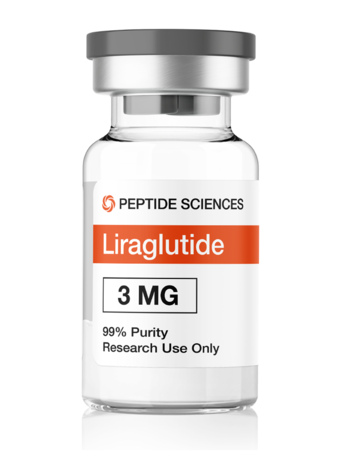Liraglutide is a derivative of GLP-1, a natural peptide known to lower blood sugar and increase insulin secretion. Research shows that liraglutide (an analog of GLF) can also improve heart, liver, and lung function, helping to slow or prevent the effects of Alzheimer's disease. Liraglutide has been shown to significantly reduce appetite, delay gastric emptying, and reduce intestinal motility. Liraglutide has been modified for a longer half-life and more favorable pharmacokinetics. You can buy it in our online store.
Description of liraglutide and glucagon-like peptide-1
GLP-1, short for glucagon-like peptide-1, is a short natural peptide hormone with a length of only 30-31 amino acids.
Its main physiological function — decrease in blood sugar level due to natural enhancement of insulin secretion. It also plays a role in protecting insulin reserves in beta cells, promoting the transcription of the insulin gene, and is associated with neurotrophic effects in the brain and central nervous system. It has been shown that in the gastrointestinal system, GLP-1 significantly reduces appetite, delaying gastric emptying and reducing intestinal peristalsis. Preliminary studies have shown the effect of GLP-1 on the heart, fat, muscles, bones, liver, lungs and kidneys.
Main focus in GLP-1 research. treatment/prevention of diabetes, as well as appetite suppression. Secondary studies are focused on the potential benefits of the peptide for the cardiovascular system. More recent and, therefore, less reliable studies are focused on the ability of GLP-1 to prevent neurodegenerative diseases. Although this latter area of research is newer, it is also a rapidly growing area of GLP-1 research now that the peptide has been found to slow or prevent the accumulation of beta-amyloid plaques in Alzheimer's disease.
Investigation of liraglutide and GLP-1
Incretin effect of GLP-1
Perhaps the most important effect that GLP-1 has, according to Dr. Holst, is called the "incretin effect". Incretins are a group of metabolic hormones that are released by the gastrointestinal tract and cause a decrease in the level of glucose (sugar) in the blood. It was shown that GLP-1 is one of the two most important hormones (the second - GIP) stimulating the incretin effect in rodent models. Although GIP circulates at levels approximately 10 times higher than GLP-1, there is evidence that GLP-1 is the more potent of the two molecules, especially when blood glucose levels are quite high.
The GLP-1 receptor has been identified on the surface of pancreatic beta cells, suggesting that GLP-1 directly stimulates exocytosis of insulin from the pancreas. It was shown that in combination with sulfonylurea drugs, GLP-1 increases insulin secretion so much that it causes mild hypoglycemia in 40% of subjects. Of course, increased insulin secretion is associated with a number of trophic effects, including increased protein synthesis, decreased protein breakdown, and increased uptake of amino acids by skeletal muscles.
GLP-1 and protection of beta cells
Studies in animal models show that GLP-1 can stimulate the growth and proliferation of beta cells of the pancreas and that it can stimulate the differentiation of new beta cells from precursors in the epithelium of the ducts of the pancreas.
Studies have also shown that GLP-1 inhibits apoptosis of beta cells.
. Taken together, these effects tip the normal balance of beta cell growth and death toward growth, suggesting that the peptide may be useful in treating diabetes and protecting the pancreas from damage that damages beta cells
In one particularly convincing study, it was shown that GLP-1 inhibits the death of beta cells caused by an increased level of inflammatory cytokines. In fact, mouse models of type 1 diabetes have shown that GLP-1 protects islet cells from destruction and may actually be a useful means of preventing type 1 diabetes.
GLP-1 and the brain
There is some evidence to suggest that GLP-1 may improve learning and help protect neurons from neurodegenerative diseases such as Alzheimer's disease. In one study, it was shown that GLP-1 enhances associative and spatial learning in mice and even improves learning deficits in mice with specific gene defects. In rats that overexpress the GLP-1 receptor in certain areas of the brain, learning and memory are significantly better than in the control group.
Additional studies in mice have shown that GLP-1 can help protect against excitotoxic neuronal damage, fully protecting rat models of neurodegeneration from glutamate-induced apoptosis. The peptide can even stimulate the growth of neurites in cultured cells. Researchers hope that additional studies of GLP-1 will show how it can be used to stop or reverse some neurodegenerative diseases.
Interestingly, GLP-1 and its analogue exendin-4 have been shown in mouse models to reduce levels of beta-amyloid in the brain, as well as the beta-amyloid precursor protein found in neurons. Beta-amyloid is a major component of the plaques seen in Alzheimer's disease, plaques that, although not necessarily causal, are associated with the severity of the disease. It is not yet known whether preventing the accumulation of beta-amyloid can protect against the effects of Alzheimer's disease, but this study at least provides a tantalizing clue to understanding how scientists can intervene in the progression of mild cognitive impairment to full-blown Alzheimer's disease.
GLP-1 exhibits minimal to moderate side effects, low oral bioavailability and excellent subcutaneous bioavailability in mice. The dosage per kg for mice does not apply to humans. GLP-1 sold by Peptide Sciences is intended for educational and scientific research only and not for human consumption. Buy GLP-G" only if you are a licensed researcher.



